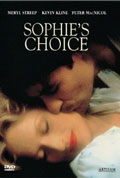
Directed by
Alan J. Pakula
150 minutes
Rated M
Reviewed by
Bernard Hemingway

Sophie's Choice
I haven’t read the William Styron novel from which this film was adapted by director Alan J. Pakula but particularly with the explicit references to Walt Whitman, Thomas Wolfe and Hart Crane it is evidently is in the elegiac tradition of American literature. Pakula keeps it firmly in that place with a tasteful retro production design and a literary first person narration which, somewhat oddly, is in a different voice (that of Josef Sommer) to the actor playing the narrator. All this means that Sophie’s Choice is probably going to appeal more to an American audience (although rather oddly the only major Oscar nomination it received was for Meryl Streep) than others.
The characters are drawn from a familiar typology: the first person narrator is young author Stingo (Peter MacNicol) who arrives in Brooklyn from the Deep South just after WWII. There he meets the charismatic Nathan Landau (Kevin Kline) and his beautiful lover, Sophie Zawistowski (Streep). Much of the first half of the film is taken up showing us the doings of this clearly doomed triangulation. Gradually Sophie’s Holocaust survivor story emerges whilst Nathan is revealed to be bipolar (he is mistakenly described as a paranoid schizophrenic). In what is a high concept coming-of-age story Stingo learns about life’s harsh realities.
Capping a successful career (this was his last significant film) Pakula uses desaturated flashbacks to tell Sophie’s story, which is a chilling one of Nazi cruelty, whilst Nathan’s story emerges in the present. Both Streep (winning her first Oscar) and Kline (making his feature film debut) are excellent although Streep’s Polish accent feels a bit intrusive at times. Peter MacNicol in only his second feature film (he largely sank from sight thereafter and has had a journeyman career in television since) is also effective as the wide-eyed young writer.
Even recognizing the need to establish the gradual tearing away of the veil of innocence in order to bring home the crushing sadness of the story, all beautifully realized by Néstor Almendros’ fine cinemtography, for my money the early stages of the film should have been pruned as the pace feels unnecessarily drawn out and, more grievously, in over-familiar ways.
Although being a quality example of mainstream Hollywood fare with less decorative fill and more dramatic directness this would have been a stronger film. But then it wouldn't be a Hollywood one would it?
Want something different?





